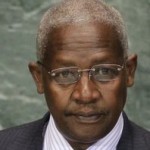The United Nations: perhaps irrelevant, but now also offensive
 Although some of you might always have considered the United Nations an irrelevance, it would be an unfair critic who claimed that they do no good at all – their World Food Programme, for example, claims to provide food to 90 million people per year.
Although some of you might always have considered the United Nations an irrelevance, it would be an unfair critic who claimed that they do no good at all – their World Food Programme, for example, claims to provide food to 90 million people per year.
But they have their critics, ranging from those upset by the UN’s failure to endorse the 2003 invasion of Iraq, to claims that the arrival of UN peacekeeping troops tends to reliably correlate with an increase in child prostitution. As with any large political organisation, criticism can be partisan and ideologically-motivated, often forgetting that realpolitik comes with compromise.
So I’d usually be inclined to charity when accusing them of failing to meet their objectives, in that outsiders have little idea how much internal debate and dissent ends up generating a conclusion that might or might not match the one we’d have hoped for.
Nevertheless, there are bone-headed moves that seem easy to avoid, and are therefore alarming when they come to pass, in that they speak of fundamental disregard for essential elements of the UN Charter. Article 1 of the Charter – addressing the “Purposes of the United Nations” – contains the following two clauses:
3. To achieve international co-operation in solving international problems of an economic, social, cultural, or humanitarian character, and in promoting and encouraging respect for human rights and for fundamental freedoms for all without distinction as to race, sex, language, or religion; and
4. To be a centre for harmonizing the actions of nations in the attainment of these common ends.
With those clauses in mind, the election of Uganda’s Sam Kutesa as the incoming President of the General Assembly is an insult to not only the stated purpose of the UN, but more importantly to the gay citizens of Uganda who live in fear of persecution by their homophobic state.
Kutesa has been Uganda’s foreign minister since 2005, and it thus fell to him to defend the law that was passed earlier this year that threatens gay people with life imprisonment. He claims he’s not a homophobe, and yes, he doesn’t seem quite as much the homophobe as President Museveni is, but he nevertheless defends the law in saying “the majority of Africans abhor this practice”, and “we shall not accept [homosexuality’s] promotion and exhibition, because we think that is wrong for our young people and it offends our culture”.
It is also alleged that his close friendship with Museveni has allowed Kutesa to evade numerous corruption charges, and activists are currently lobbying the US State Department to revoke his visa.
Whether those charges end up sticking or not (or are even true), remind yourselves of how overt and shameful the Ugandan government’s homophobia is, and then marvel at the fact that this man, their foreign minister, is unopposed for the position of President, after being selected as the African Union’s nominee (member groups take turns, and this was Africa’s).
We can’t be surprised that South Africa didn’t oppose this candidacy at the African Union – as I’ve remarked before, if we’re going to send a homophobe to Uganda as our ambassador, the rights of gay folk (i.e. the standard set of “human” rights) don’t seem that much of a concern in our foreign affairs.
Tonight, our President, Jacob Zuma, delivers another “State of the Nation” address. He’s likely to try to mollify investors, what with a 5 month-long mining strike, ratings downgrades and the like. I’m not expecting him to say anything about moral leadership on the continent, even though he presides over a country where a top official in a major company can be given a wife as a gift.
The UN can perhaps say something about moral leadership for their member states, and to the world, by finding a way to stop Uganda’s foreign minister from becoming President of the UN General Assembly. The African Union should never have nominated him, and the shame is chiefly theirs – including ours as South Africa.
Nations like this should not be rewarded for treating other humans as second-class citizens. Men like this should not be allowed preside over a body tasked with “harmonizing the actions of nations” in “encouraging respect for human rights and fundamental freedoms”.
But, they probably will be. Now, and again in the future, because we don’t want to make a fuss, or offend. We don’t want to tell people that they need to drag their minds and nations into modernity, else they just don’t get to sit at the adult table.
Like we should do.


Recent Comments